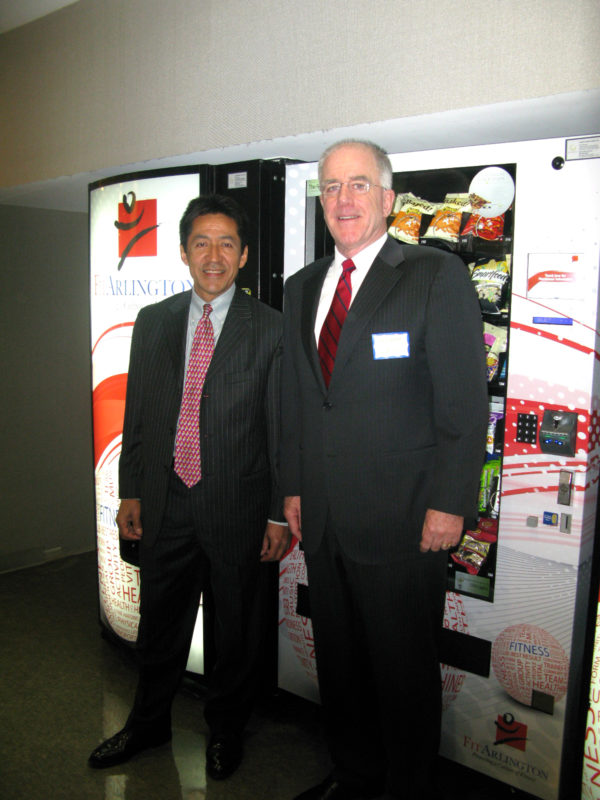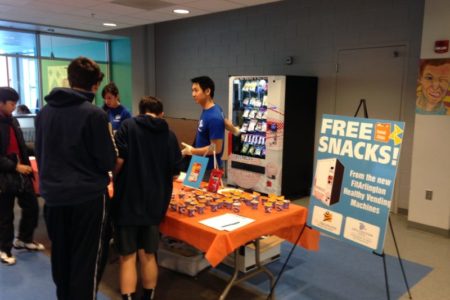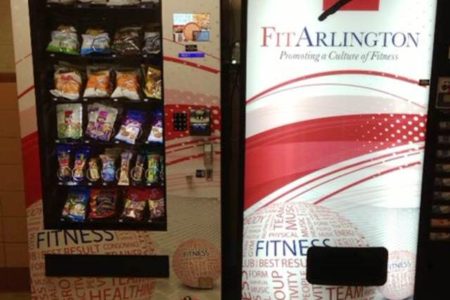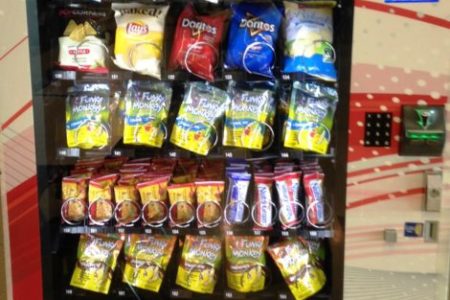
Share On Social!
What good is physical activity if you fuel up with junk food and sugary drinks? One leader in Arlington County, Va., realized that the absence of healthy drink and snack options at parks and public buildings was sending an unclear message to the community about the importance of proper nutrition for an active lifestyle. With overwhelming community support, he drove good-for-you options into vending machines in county-owned property and local schools, creating an environment that weaves both nutrition and physical activity into the fabric of neighborhood health.
EMERGENCE
Awareness: Families in Arlington County, Va., come from many different cultural backgrounds.
Among the county’s 16% Latino population, this diversity is apparent.
“The Latino population is probably a bit different than you would find in most cities around the United States,” including Latinos from El Salvador, Bolivia and parts of Central America, said Walter Tejada, an Arlington County Board Member and two-time County Board chair.
Tejada, a long-time champion for healthy communities, moved to the U.S. from El Salvador when he was 12 years old.
In El Salvador, he said he never had to worry about eating healthy—it was all around him.
Tejada recalls playing soccer as a young boy and refueling with nutrient-packed mangos, melons, and bananas: “That’s what you snacked on…that became a part of my culture as a child,” he said.
But in the United States today, healthy eating isn’t as common and families increasingly opt for junk food, fast food, and sugary drinks.
This problem especially affects Latino kids, who studies found drink one more sugary drink a day than their White peers, which puts these kids at a higher risk for chronic diseases.

“We need to make healthy eating and healthy living cool for kids,” he said. “That comes by making it part of our natural environment.”
So Tejada in 2008 used his position on the county board to form FitArlington, a countywide collaboration with the Arlington Parks and Recreation Department that promotes healthy living through working with city officials, businesses, community members, and schools.
“It’s about promoting and creating a culture of fitness,” he said.
Learn: Tejada brought the FitArlington coalition together to find out what the city was already doing to help families stay active and eat better, and brainstorm new healthy living ideas.
Tejada learned that greasy chips, cookies, and sugary drinks were among the nutritionally poor options currently being offered in vending machines at the county-owned parks, community centers, and other public buildings.
You can’t have a “culture of fitness” without making sure proper nutrition is part of the equation alongside trails and 5K races, Tejada said.
“Shouldn’t you have an option that tastes pretty good and happens to be healthy?” he said.
Frame Issue: Tejada decided to try to revamp the food and drink options in vending machines—not only in county facilities, but also in public schools.
“We’ve got to provide options for healthy drinks,” he said.
DEVELOPMENT

Education/Mobilization: With Tejada’s vision in place, The Arlington Parks and Recreation Department (Parks and Rec) coordinated an inter-departmental team to work on developing new vending machine nutrition standards and address other logistics.
Meanwhile, FitArlington began to educate leaders and residents on how to increase the healthy options across Arlington County.
Tejada asked the school board of the Arlington Public Schools to be part of FitArlington’s efforts of promoting better vending options for kids, and the board agreed to participate.
“They needed to be at the table,” said Tejada.
Tejada and his team then visited county buildings and held taste tests where county employees or patrons could sample some new offerings, and get nutrition education.
FitArlington put ups flyers and aired commercials about healthy living. One commercial even featured Tejada on a soccer field shooting a goal.
They also held public forums in English and in Spanish to let folks know about the potential changes and gauge their interest in making the county healthier. Tejada said that community members who attended actually voted to make getting healthier a priority.
More promotion was done through FitArlington T-shirts and write-ups in the local paper.
Debate: A problem arose as Parks and Rec worked to create nutrition standards, identify products that met the standards (and tasted good), and figure out where all existing vending machines are located.
No food vendors were willing to sell healthier products in the machines.
“At first we didn’t have any luck,” Tejada said. “They were telling us there’s no market for healthy drinks.”
They kept searching, and finally identified a vendor who “got it,” said Tejada.
ENACTMENT
Activation/Frame Policy: With financial support from the Virginia Foundation for Healthy Youth, FitArlington worked with the vendor on adding healthier food options into vending machines.
The effort got a name: “FitArlington Healthy Vending Machines.”
In addition to adding healthier options, Parks and Rec proposed a pricing structure to eliminate the financial benefit of choosing junk food and sugary drinks.
That way, someone wouldn’t pick a soda just because it was cheaper than a bottled water, Tejada said.

Parks and Rec also worked on the design of the vending machines, making sure the FitArlington logo was front and center as well as appealing.
Change: In Spring 2014, Arlington County parks and facilities and schools started becoming equipped with healthy vending machines with these criteria, which meet the USDA Smart Snacks in Schools food standards and ensure that all snacks and drinks are well-balanced and healthy:
- Beverages will have no artificial sweeteners.
- Bottled water is available, as well as juices.
- Snacks will have no more than 200 calories, 35% calories from fat, 10% of calories from saturated fat, 35% sugar and 200 mg sodium.
- Snacks will have no trans fats and are made with whole grains.
Bottled water and 100% juice make up the new beverage options. Dried fruit, baked chips, and granola bars are among the new snacks featured.
The whole community was working to ensure healthy living became a way of life for kids starting at an early age.
“It’ll become second nature when you get older,” said Tejada.
“You may not be able to get everything you want, but they may be willing to work with you on some things,” Reid said.
IMPLEMENTATION
Implementation: Parks and Rec said the community response has been great.
Many parents have said how happy they are with the new products and appreciate healthy items being so convenient.
Strong sales data in some of the more popular community centers has been another indication of success, according to Parks and Rec officials.
Additionally, by June 2014, Arlington Public Schools followed the lead of Parks and Rec and added 115 of the new vending machines, which dispensed an array of nutritional snacks and beverages at all 40 public school buildings across the district.
“We were very happy to partner with FitArlington to make sure our students receive the best nutritional options available to them while at school,” said Superintendent Dr. Pat Murphy in a statement. “We know that students who maintain a healthy lifestyle are also more focused, perform better at school, and lead happy and successful lives, a part of their health, well-being, and future.”
Equity: Parks and Rec has taken the lead on building a team to monitor compliance, making sure all county locations are stocking their vending machines with the new healthy drinks and snacks.
Tejada said that everyone involved in the planning and implementation of FitArlington has been totally on board with his vision of health for the community.
“It’s been exciting to work with staff who are just as excited as me,” he said.
Sustainability: With the schools implementing the new vending as well as the community centers, Tejada is confident that the healthy options will have a lasting impact on the health of kids in Arlington County.
What’s next for FitArlington? Recently, the county ran a pilot project in schools where parents and kids together learned about healthy eating, which included many Latino families.
Additionally, Tejada said he hopes to work on making sidewalks more connected to residents can get safely around the community by foot.
Ultimately, he is proud that the community as a whole has taken an interest in getting kids and adults excited about healthy living.
“I didn’t want this to be a thing where we are wagging our fingers at kids saying, ‘Don’t do that,’” he said. “We need to lead by example.”
This success story was produced by Salud America! with support from the Robert Wood Johnson Foundation.
The stories are intended for educational and informative purposes. References to specific policymakers, individuals, schools, policies, or companies have been included solely to advance these purposes and do not constitute an endorsement, sponsorship, or recommendation. Stories are based on and told by real community members and are the opinions and views of the individuals whose stories are told. Organization and activities described were not supported by Salud America! or the Robert Wood Johnson Foundation and do not necessarily represent the views of Salud America! or the Robert Wood Johnson Foundation.
ABOUT THE PROGRAM
Salud America! The RWJF Research Network to Prevent Obesity Among Latino Children is a national program of the Robert Wood Johnson Foundation. The program aims to educate researchers, decision-makers, community leaders, and the public in contributing toward healthier Latino communities and seeking environmental and policy solutions to the epidemic of Latino childhood obesity. The network is directed by the Institute for Health Promotion Research at the University of Texas Health Science Center at San Antonio.
For more information, visit http://www.salud-america.org.
By The Numbers
33
percent
of Latinos live within walking distance (<1 mile) of a park
This success story was produced by Salud America! with support from the Robert Wood Johnson Foundation.
The stories are intended for educational and informative purposes. References to specific policymakers, individuals, schools, policies, or companies have been included solely to advance these purposes and do not constitute an endorsement, sponsorship, or recommendation. Stories are based on and told by real community members and are the opinions and views of the individuals whose stories are told. Organization and activities described were not supported by Salud America! or the Robert Wood Johnson Foundation and do not necessarily represent the views of Salud America! or the Robert Wood Johnson Foundation.



